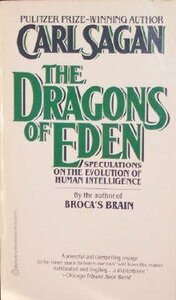Take a photo of a barcode or cover
challenging
informative
inspiring
reflective
slow-paced
Dragons of Eden is a nonfiction book that takes the reader from the beginnings of man all the way up to modern days. He expresses his theories about evolution in a way that can be easily comprehended with some focus. Sagan discusses reasons for human behavior and how these behavior might have been beneficial to earlier man during the prehistoric ages. For example, our fear of heights. In Sagan’s opinion, humans are inherently afraid of heights because early humans swung from tree to tree like apes. The easiest way to die (at this time) was by falling to the jungle floor. Sagan also goes into detail about parallels between the Bible and human evolution. This part was most intriguing to me, as a Catholic, and I gained new insight into evolutionary concepts. Overall, the book was quite effective in establishing Sagan’s ideas. He used lots of concrete evidence and understandable language. I think that anyone with a basic understanding and interest in science or anthropology would enjoy this book.
1. It feels like non-fiction got a lot better since then at exploiting the curiosity gaps.
2. We learned a lot about neuroscience since 1977, but still moved in the same direction, so the book is still correct about many things at large, although details are often important.
3. Contrary to [a:Geoffrey Miller|15428|Geoffrey Miller|https://d.gr-assets.com/authors/1442358111p2/15428.jpg], who tells that evolutionary psychology was extremely controversial at the moment (just two years after the Sociobiology release—which, by the way, is not mentioned at all), here’s a Pulitzer winner that has a lot about how the human mind was defined by its evolution (although, admittedly, without many crucial details).
4. A good book to learn something about the history of the area. If you want to learn about evolutionary psychology itself, you’d be better off starting elsewhere.
2. We learned a lot about neuroscience since 1977, but still moved in the same direction, so the book is still correct about many things at large, although details are often important.
3. Contrary to [a:Geoffrey Miller|15428|Geoffrey Miller|https://d.gr-assets.com/authors/1442358111p2/15428.jpg], who tells that evolutionary psychology was extremely controversial at the moment (just two years after the Sociobiology release—which, by the way, is not mentioned at all), here’s a Pulitzer winner that has a lot about how the human mind was defined by its evolution (although, admittedly, without many crucial details).
4. A good book to learn something about the history of the area. If you want to learn about evolutionary psychology itself, you’d be better off starting elsewhere.
I read many of Sagan's books years ago, but I recall this being my favorite.
challenging
informative
reflective
fast-paced
adventurous
informative
medium-paced
Written in 1977 about the workings and evolution of the human brain, it seems that it would be outdated. It is here and there, but it is still and excellent book to read!
challenging
hopeful
informative
inspiring
medium-paced
Very interesting. Can’t say I’d recommend this to just anyone. I enjoyed parts of it but how much I retain or am able to apply to my life is anyone’s guess. I’m still not sure if there was a point other than at the end where he makes the case to continue our intellectual and scientific growth as a society.

